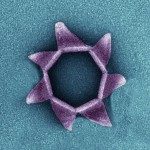Lien vers Pubmed [PMID] – 21034815
Res. Microbiol. 2011 Jan;162(1):53-70
Understanding early evolution is a major challenge for the post-genomic era. A promising way to tackle this issue is to analyze the evolutionary history of key cellular systems through phylogenomic approaches. The current availability of genomic data from representatives of diverse lineages (especially eukaryotes), together with the ever growing number of proteomic characterizations now provides ample material to apply this type of analyses to trace back the origin and evolution of the three domains of life. Here, we have reconstructed the composition of the ancestral mitochondrial ribosome in the Last Eukaryotic Common Ancestor (LECA) and investigated its subsequent evolution in six major eukaryotic supergroups. We infer that LECA possessed a mitochondrial ribosome that was already much larger than its bacterial ancestor, with 19 additional specific proteins, indicating that a certain amount of time occurred between initial endosymbiosis at the origin of the mitochondrion and the diversification of present-day eukaryotic supergroups. Subsequently, mitochondrial ribosomes appear to have undergone a very dynamic evolutionary history in the different eukaryotic lineages, involving the loss of different sets of ribosomal protein-coding genes, their transfer to the host genome, as well as the acquisition of many novel components. This chaotic history for a such fundamental cellular machinery is puzzling, especially when compared to cytosolic, bacterial or chloroplastic ribosomes, which are much more stable. Intriguingly, archaeal ribosomes also show a very dynamic nature, with multiple independent losses among lineages.



